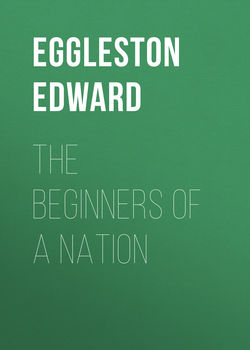Читать книгу The Beginners of a Nation - Eggleston Edward - Страница 15
BOOK I.
RISE OF THE FIRST ENGLISH COLONY
CHAPTER THE SECOND.
JAMES RIVER EXPERIMENTS
V
ОглавлениеFounding of Jamestown. The colonists chose for the site of their town what was then a malarial peninsula; it has since become an island. The place was naturally defended by the river on all sides, except where a narrow stretch of sand made a bridge to the main. 10 Its chief advantage in the eyes of the newcomers was that the deep water near the shore made it possible to moor the ships by merely tying them up to trees on the river bank. Relatyon of the Discovery of our River, Am. Antiq. Soc., iv, 61. Here the settlers planted cotton and orange trees at once, and experimental potatoes, melons, and pumpkins, but they postponed sowing grain until about the first of June in our reckoning.
The winter of misery. They took up their abode in hastily built cabins roofed with sedge or bark, and in ragged tents. The poorer sort were even fain to shelter themselves in mere burrows in the ground. A. D. 1607. Ill provided at the start, the greater part of their food was consumed by the seamen, who lingered to gather comminuted mica for gold. In this hard environment, rent by faction, destitute of a competent leader and of any leader with competent authority, the wonder is that of this little company a single man survived the winter. Purchas, p. 1690. "There never were Englishmen left in any foreign country in such misery as we were in this new-discovered Virginia," says George Percy, brother to the Earl of Northumberland. A pint of worm-eaten barley or wheat was allowed for a day's ration. This was made into pottage and served out at the rate of one small ladleful at each meal. "Our drink was water, our lodgings castles in the air," says Smith. The misery was aggravated by a constant fear of attack from the Indians, who had been repulsed in an energetic assault made soon after the landing of the English. It was necessary for each man to watch every third night "lying on the cold, bare ground," and this exposure in a fever swamp, with the slender allowance of food of bad quality and the brackish river water, brought on swellings, dysenteries, and fevers. Sometimes there were not five men able to bear arms. "If there were any conscience in men," says Percy, "it would make their hearts bleed to hear the pitiful murmurings and outcries of our sick men without relief every day and night for the space of about six weeks." The living were hardly able to bury the dead, whose bodies were "trailed out like dogs." Half of the hundred colonists died, and the survivors were saved by the Indians, who, having got a taste of muskets and cannon in their early attack on Jamestown, now brought in supplies of game, corn, persimmons, and other food, to trade for the novel trinkets of the white men.
10
In 1889, when I visited Jamestown, there was no apparent trace of Sandy Beach which had connected the island with the mainland. This bit of sand, in the antique phrase of one of the early colonists, was "no broader than a man may well quaite a tileshard." Strachey, in Purchas, p. 1752. Jamestown is now a farm; the ruins of the church and many of the tombs in the eighteenth-century churchyard remain; but the upper end of the island is wearing away, and I picked out of the crumbling sand, far from the later burying place, human bones of earlier burials, possibly of the victims of the famines and epidemics. The walls of the magazine had been exposed by erosion. I brought away wrought nails, bits of glass grown iridescent from long burial, and an exploded bombshell of so small a caliber as to mark its antiquity. By the aid of a negro youth living on the farm I found the hearth bricks turned up in various places by the plow, and the arrangement, or rather lack of arrangement, of the town could thus be made out. My guide volunteered the information that Jamestown was "the first place discovered after the Flood." Some drawings made at the time were reproduced with an article on Nathaniel Bacon in the Century Magazine for July, 1890.
